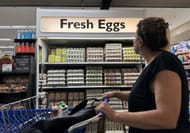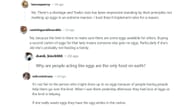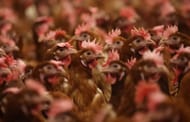Trader Joe’s has implemented a nationwide limit on eggs, capping purchases to one dozen per customer daily, effective February 8, 2025. The policy addresses dual challenges: a severe avian influenza outbreak and the retailer’s ongoing transition to cage-free eggs.
Eggs at Trader Joe’s remain priced around $5 per dozen, below the national average of $4.15 (December 2024), and $7+ at competitors.
Why Trader Joe’s introduced the limit on eggs

The limit on eggs follows a 36.8% year-over-year price surge linked to avian influenza, which has led to the culling of over 150 million U.S. birds since 2022. Trader Joe’s spokesperson Nakia Rohde stated the policy aims to “ensure as many customers who need eggs can purchase them.”
Concurrently, the chain is phasing out conventional eggs to meet its 2025 cage-free pledge, a shift contributing to temporary shortages.
The avian flu outbreak has significantly impacted egg production, with major producers like Cal-Maine Foods culling millions of birds. The USDA reports that table-egg-laying flocks have been particularly hard-hit, with "over 3.97 million birds depopulated in November 2024" alone. This has created a supply crunch, forcing retailers to implement measures like purchase limits to manage demand.
Customer reactions to the limit on eggs

Social media responses highlight mixed reactions to the egg purchase limit. In a Reddit thread, one user recounted being asked to buy an extra dozen eggs for an elderly customer. Despite some frustrations, many users supported Trader Joe’s decision, emphasizing that the limit helps ensure fair access.
One commenter mentioned, "My TJ’s instituted the one dozen per household rule this week. Normally, they’re out by 8:30 a.m., but I was there at 9:15 and there were still eggs left."
On Twitter, reactions varied. Some criticized the policy as creating "artificial scarcity," while others saw it as a necessary response to the shortage.
"This is what happens when you kill off all the chickens," one tweet read.
While another noted, "I saw that and they had plenty lol."
The new rule has sparked discussions but appears to be a step toward managing supply during a challenging time.
Bird flu’s impact beyond Trader Joe’s
The limit on eggs reflects industry-wide strain. Waffle House added a $0.50 surcharge per egg in February 2025, while Costco imposed a three-dozen limit at some locations. The USDA predicts a further 20.3% price hike in 2025 due to outbreaks and cage-free mandates in states like California and Oregon.

The avian flu crisis has disrupted not only egg supplies but also poultry meat production, leading to higher prices across the board. The Centers for Disease Control and Prevention (CDC) reports that over 149 million birds have been affected as of January 2025, up from 128 million in early 2024. This has forced farmers to increase biosecurity measures, further driving up costs.
A temporary measure with long-term implications
Trader Joe’s limit on eggs highlights vulnerabilities in food systems from disease and policy shifts. While the cap ensures short-term equity, long-term stability hinges on containing avian flu and adapting to cage-free production. For now, customers navigate a market where ethics and scarcity collide.
The USDA and industry experts are working on solutions to mitigate future disruptions, including improved biosecurity measures and faster vaccine development for poultry. Until then, retailers like Trader Joe’s will continue to balance customer needs with supply constraints, ensuring fair access to essential products.
